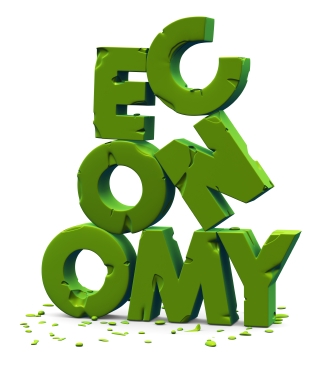 We’ve been getting a steady stream of good news on the economy for at least the past couple of years. But as we roll into the new year the more relevant question is, is your economy looking brighter in 2014? The national statistics may be encouraging, but what each of us is experiencing individually is far more relevant – at least to us.
We’ve been getting a steady stream of good news on the economy for at least the past couple of years. But as we roll into the new year the more relevant question is, is your economy looking brighter in 2014? The national statistics may be encouraging, but what each of us is experiencing individually is far more relevant – at least to us.
We can immerse ourselves in all of the statistics we want, but sometimes the better approach is to interview the “man or woman on the street”. And that’s what I’m doing in this article – asking you to report on the most important economy in your life – yours.
Since the economy – on either a national or personal level – plays out on various fronts, let’s look at several different categories.
Your income
We’re hearing and reading a lot about improvement in employment, but statistics on income are not as readily reported. Where they are, they seem to be telling something of a different story. Last August, the New York Times reported that the median income in the US is still 6% below where it was at the start of the recession in 2007.
So ignoring the rosy unemployment figures, how is your income doing this year? Were either your job or your paycheck downsized during the recession? If so, has your income fully recovered from that hit? Are you making more now than you were in 2007?
More jobs and business opportunities
One of the biggest personal stresses that characterized the recession and the years following, was the absence of replacement jobs. People who held their jobs through and after the recession made out okay. But for those who lost a job, replacement was often close to nonexistent – or it meant taking a much lower paying position.
In your career and industry, are you seeing more jobs than there were a few years ago? Perhaps more important, are there more opportunities for promotion? Has upward mobility been restored in your life, or do you continue to feel trapped in your current position?
Cost of living
[adsenseRight]
This is something of an “X” factor. While the Consumer Price Index (CPI) has been providing a steady stream of very low inflation numbers for years, the cost of living for the middle class seems to have exploded nonetheless. This is particularly true if you look at certain important categories, such as healthcare, insurance, utilities, education, repairs, and even food.
Do you feel that your income has kept pace with rising price levels? Or do you feel that the cost of living is slowly but steadily lowering your standard of living, despite a higher income?
Retirement planning
The stock market has been booming for the past 4 ½ years, and many retirement plans fully recovered their losses from the 2007 – 2009 stock market crash. Many have moved well beyond.
Has your retirement portfolio increased overall since 2007? Are your average annual investment returns roughly matching those of the DOW and the S&P 500? Were you forced to liquidate a large chunk of your retirement portfolio during or after the recession, that you have not been able to replace since?
Your savings
In a real way, your level of savings may be the strongest barometer of the state of your economy – and even of the national economy. It’s what’s left over after paying all of your bills. A growing savings account represents a healthy level of surplus in your budget. By contrast, an absence of savings is an indication of continued struggle.
Many households were forced to deplete savings during and after the recession in order to compensate for a missing or reduced paycheck. Have you been able to rebuild your savings since?
Your debt
Scattered reports are indicating that personal debt has been declining in recent years. This has alternatively been explained as either the result of improving household incomes and balance sheets, or the fact that economically shell shocked Americans are increasingly becoming debt-averse. It’s even been speculated that declining debt levels are preventing a more robust recovery, since debt is generally correlated with spending.
How is that functioning in your world? Have you been steadily paying down your debt, as much of the rest of the nation has apparently been doing? Or are you finding yourself going deeper in debt, as a means to deal with either a lower income or reduced purchasing power?
Your home equity
This category is a mixed bag – much depends on your local real estate market. In the past couple of years, some metropolitan areas have seen a rapid recovery in housing prices. Others have continued to languish, and a small number have experienced continued declines. Real estate equity – the difference between the value of your home, and the debt it secures – is considered to be a significant component of American’s sense of well-being. A healthy and growing home equity creates the confidence that encourages people to go out and spend money.
What is the situation with your home equity? Is it greater than it was a few years ago? Has the value of your home fully recovered to the levels of 2006 – 2007? Are you optimistic about future price trends in your area? How quickly or easily do you think it would be to sell your home if you needed to do it right now?
Feel free to step up and answer as many of these questions as you feel comfortable doing. Your feedback may help give others a better idea of exactly where the economy stands going into 2014. You can also refer to bbt.com for many of the answers to these questions. I don’t know about you, but no one ever calls me or sticks a microphone in my face, and asks me what I think about the economy. This is your chance to voice your opinion!

James Hendrickson is an internet entrepreneur, blogging junky, hunter and personal finance geek. When he’s not lurking in coffee shops in Portland, Oregon, you’ll find him in the Pacific Northwest’s great outdoors. James has a masters degree in Sociology from the University of Maryland at College Park and a Bachelors degree on Sociology from Earlham College. He loves individual stocks, bonds and precious metals.

